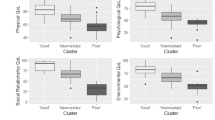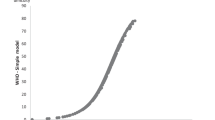Abstract
Purpose
The modified DUKE-UNC Functional Social Support Questionnaire (FSSQ) is considered a psychometric instrument to assess the social support in patients with schizophrenia. However, it has not been validated in this patient population. This issue is addressed here by examining the tool’s psychometric properties in a clinical sample of patients with schizophrenia.
Methods
Two hundred and forty-one patients from ten Adult Mental Health Centres (AMHC) meeting the following inclusion criteria were included: (1) International Classification of Diseases-10 (ICD-10) diagnosis of schizophrenia; (2) Global Assessment of Functioning (GAF) scores ≤50; (3) Illness duration of more than 2 years; and (4) Clinical stability. Patients were evaluated at baseline and at 1-year follow-up for clinical and psychosocial variables.
Results
The factor analysis revealed two factors that explained 54.15 % of the variance. Internal consistency was excellent for the total FSSQ (0.87 at baseline and 0.88 at 1 year follow-up) and ranged between adequate and excellent for FSSQ domains. Correlations between FSSQ scores and those of global functioning, psychiatric symptoms, disability and quality of life ranged between small and large. There were significant differences between groups of patients with schizophrenia in FSSQ scores. Patients with higher levels of somatic complaints and patients who were disabled scored significantly lower in some or all FSSQ scores. After 1-year follow-up, patients improved in overall functioning and there was a decrease in psychiatric symptoms. There were mainly small significant associations between changes in FSSQ scores from baseline to 1-year follow-up and changes in the rest of the test scores, and AMHC visits between baseline and 1-year follow-up.
Conclusions
The FSSQ scores are reliable and valid, which suggests that the instrument is appropriate for the assessment of perceived social support in patients with schizophrenia.
Similar content being viewed by others
References
American Educational Research Association, American Psychological Association, National Council on Measurement in Education (1999) Standards for educational and psychological testing. American Educational Research Association, Washington DC
American Psychiatric Association (1994) Diagnostic and statistical manual of mental disorders, 4th edn. American Psychiatric Association, Washington DC
Barrera M (1978) A method for the assessment of social support networks in community survey research. Connect 3:8–15
Becchi A, Rucci P, Placentino A, Neri G, de Girolamo G (2004) Quality of life in patients with schizophrenia—comparison of self-report and proxy assessments. Soc Psychiatry Psychiatr Epidemiol 39:397–401
Bellón Saameño JA, Delgado Sánchez A, de Dios Luna del Castillo J, Lardelli Claret P (1996) Validez y fiabilidad del cuestionario de apoyo social funcional DUKE-UNC-11. Aten Primaria 18:153–163
Broadhead WE, Gehlbach SH, DeGruy FV, Kaplan BH (1988) The Duke-UNC functional social support questionnaire: measurement of social support in family medicine patients. Med Care 26:709–723
Broadhead WE, Gehlbach SH, DeGruy FV, Kaplan BH (1989) Functional versus structural social support and health care utilization in a family medicine outpatient practice. Med Care 27:221–233
Brugha TA, Wing JK, Brewin CR, MacCarthy B, Lesage A (1993) The relationship of social network deficits with deficits in social functioning in long-term psychiatric disorders. Soc Psychiatry Psychiatr Epidemiol 28:218–224
Cechnicki A, Wojciechowska A (2007) Correlations between features of social network and outcomes in those suffering from schizophrenia seven years from the first hospitalization. Psychiatr Pol 41:513–525
Chinman MJ, Weingarten R, Stayner D, Davidson L (2001) Chronicity reconsidered: improving person environment fit through a consumer-run service. Community Ment Health J 37:215–229
Cohen J (1988) Statistical power analysis for the behavioral sciences, 2nd edn. Lawrence Erlbaum, New Jersey
Corrigan PW, Phelan SM (2004) Social support and recovery in people with serious mental illnesses. Community Ment Health J 40:513–523
de la Revilla AhumadaL, Bailón E, de Dios Luna J, Delgado A, Prados MA, Fleitas L (1991) Validación de una escala de apoyo social funcional para su uso en la consulta del médico de familia. Aten Primaria 8:688–692
Field A (2005) Discovering statistics using SPSS, 2nd edn. SAGE Publications, London
Goldberg RW, Rollins AL, Lehman AF (2003) Social network correlates among people with psychiatric disabilities. Psychiatr Rehabil J 26:393–402
Haertel EH (2006) Reliability. In: Brennan RL (ed) Educational measurement. American Council on Education and Praeger Publishers, Wesport CT, pp 65–110
Hair JF, Anderson RE, Tatham RL, Black WC (1995) Multivariate data analysis. Prentice Hall, Englewood Cliffs
Janca A, Kastrup M, Katschnig H, López-Ibor JJ, Mezzich JE, Sartorius N (1996) The World Health Organization short disability assessment schedule (WHO DAS-S): a tool for the assessment of difficulties in selected areas of functioning of patients with mental disorders. Soc Psychiatry Psychiatr Epidemiol 31:349–354
Johnson DL (2010) Social Support. In: Johnson DL (ed) A compendium of psychosocial measures. Assessment of people with severe mental illnesses in the community. Springer, New York, pp 165–174
Jollifre IT (1986) Principal component analysis. Springer-Verlag, New York
Kay RS, Fiszbein A, Opler L (1987) The positive and negative syndrome scale (PANSS) for schizophrenia. Schizophr Bull 13:261–276
Kilbourne AM, McCarthy JF, Post EP, Welsh D, Blow FC (2007) Social support among veterans with serious mental illness. Soc Psychiatry Psychiatr Epidemiol 42:639–646
Liu T, Song X, Chen G, Buka SL, Zhang L, Pang L, Zheng X (2012) Illiteracy and schizophrenia in China. Soc Psychiatry Psychiatr Epidemiol. doi:10.1007/s00127-012-0552-3
Lucas Carrasco R (1998) La versión española del WHOQOL. Ergón DL, Madrid
MacDonald EM, Hayes RL, Baglioni AJ (2000) The quantity and quality of social networks of young people with early psychosis compared with closely matched controls. Schizophr Res 46:25–30
Mas-Expósito L, Amador-Campos JA, Gómez-Benito J, Lalucat-Jo L (2012) The World Health Organization short disability assessment schedule: a validation study in patients with schizophrenia. Compr Psychiatry 53:208–216
Mas-Expósito L, Amador-Campos JA, Gómez-Benito J, Lalucat-Jo L (2011) The World Health Organization quality of life scale brief version: a validation study in patients with schizophrenia. Qual Life Res. doi:10.1007/s11136-011-9847-1
McFarlane WR, Neale KA, Norman GR, Roy RG, Streiner DL (1981) Methodological issues in developing a scale to measure social support. Schizophr Bull 7:90–100
Moriarty A, Jolley S, Callanan MM, Garety P (2012) Understanding reduced activity in psychosis the roles of stigma and illness appraisals. Soc Psychiatry Psychiatr Epidemiol. doi:10.1007/s00127-012-0475-z
Moxley DP (1988) Measuring the social support networks of persons with psychiatric disabilities: a pilot investigation. Psychosoc Rehabil J 11:19–27
Müller P, Gaebel W, Bandelow B, Köpcke W, Linden M, Müller-Spahn F, Pietzecrer A, Tegeler J (1998) Zur sozialen Situation schizophrener Patienten [The social status of schizophrenic patients]. Nervenartz 69:204–209
Peralta V, Cuesta MJ (1994) Validación de la escala de los síndromes positivo y negative (PANSS) en una muestra de esquizofrénicos españoles. Actas Luso Esp Neurol Psiquiatr Cienc Afines 22:171–177
Rosnow RL, Rosenthal R (2005) Beginning behavioral research: a conceptual primer, 5th edn. Pearson/Prentice Hall, Englewood Cliffs NJ
Rüesch P, Graf J, Meyer PC, Rössler W, Hell D (2004) Occupation, social support and quality of life of persons with schizophrenic or affective disorders. Soc Psychiatry Psychiatr Epidemiol 39:686–694
Sarason IG, Levine HM, Basham RB, Sarason BR (1983) Assessing social support: the social support questionnaire. J Pers Soc Psychol 44:127–139
Sörgaard KW, Hansson L, Heikkilä J, Vinding HR, Bjarnason O, Bengtsson-Tops A, Merinder L, Nilsson LL, Sandlund M, Middelboe T (2001) Predictors of social relations in persons with schizophrenia living in the community: a Nordic multicentre study. Soc Psychiatry Psychiatr Epidemiol 36:13–19
Vorungati M, Cortese L, Oyewumi L, Cernovsky Z, Zirul S, Awad A (2000) Quality of life measurement in schizophrenia: reconciling the quest for subjectivity. Med Care 28:165–172
Walsh J, Connelly PR (1996) Supportive behaviors in natural support networks of people with severe mental illness. Health Soc Work 21:296–303
Wehmeier P, Kluge M, Schneider E, Schacht A, Wagner T, Schreiber W (2007) Quality of life and subjective well-being during treatment with antipsychotics in out-patients with schizophrenia. Prog Neuropsychopharmacol Biol Psychiatry 31:703–712
Working Group of the Clinical Practice Guideline for Schizophrenia and Incipient Psychotic Disorder. Mental Health Forum, coordination. Clinical Practice Guideline for Schizophrenia and Incipient Psychotic Disorder. Madrid: Quality Plan for the National Health System of the Ministry of Health and Consumer Affairs. Agency for Health Technology Assessment and Research, 2009. Clinical Practice guideline: CAHTA. Number 2006/05-2. http://www.gencat.cat/salut/depsan/units/aatrm/pdf/cpg_schizophrenia_cahta2009.pdf
World Health Organization (1995) The ICD-10 classification of mental and behavioural disorders. World Health Organization, Geneva
World Health Organization (1998) WHOQOL user manual. World Health Organization, Geneva
Xiang YT, Wang CY, Wang Y, Chiu HF, Zhao JP, Chen Q, Chan SS, Lee EH, Ungvari GS (2010) Socio-demographic and clinical determinants of quality of life in Chinese patients with schizophrenia: a prospective study. Qual Life Res 19:317–322
Yanos PT, Rosenfield S, Horwitz AV (2001) Negative and supportive social interactions and quality of life among persons diagnosed with severe mental illness. Community Ment Health J 37:405–419
Ziguras S, Stuart GW (2000) A meta-analysis of the effectiveness of mental health case management over 20 years. Psychiatr Serv 51:1410–1421
Zimet GD, Dahlem NW, Zimet SG, Farley GK (1988) The multidimensional scale of perceived social support. J Pers Assess 52:30–41
Acknowledgments
This study was supported by grant PI050789 from the Ministry of Health and Consumer Affairs of Spain, Carlos III Institute of Health, Health Research Fund, Madrid, Spain, and grant 2009SGR00822 from the Agency for Management of University and Research Grants, Government of Catalonia, Barcelona, Spain.
Conflict of interest
The authors declare no conflict of interest.
Author information
Authors and Affiliations
Corresponding author
Additional information
For the Research Group on Severe Mental Disorder. The working group members are listed in “Appendix”.
Appendix
Appendix
The Working Group on Severe Mental Disorder is composed of the following members from Adult Mental Health Care Centres in Barcelona: Mª Antonia Argany, Francesca Asensio, Marta Berruezo, Carlos Blecua, Ignasi Bros, Ana Isabel Cerrillo, Ana del Cuerpo, Amparo Escudero, Judit Farré, Clara Fort, Marisa García, Mª Carmen González, Eva Leno, Lluís Mauri, Isabel Mitjà, Mónica Montoro, Montserrat Nicolás, Rosa Ordoñez, Carmen Pinedo, Montserrat Prats, Mª Joaquina Redin, Mª Teresa Romero, Francesc Segarra, Juan Carlos Valdearcos, Immaculada Zafra, Matías Zamora and Antonio Zúñiga.
Rights and permissions
About this article
Cite this article
Mas-Expósito, L., Amador-Campos, J.A., Gómez-Benito, J. et al. Validation of the modified DUKE-UNC Functional Social Support Questionnaire in patients with schizophrenia. Soc Psychiatry Psychiatr Epidemiol 48, 1675–1685 (2013). https://doi.org/10.1007/s00127-012-0633-3
Received:
Accepted:
Published:
Issue Date:
DOI: https://doi.org/10.1007/s00127-012-0633-3




